Brian Clegg's Blog, page 39
August 17, 2017
Writing Project
 Communication is essential for any business or organisation - and the internet has made the need for written communication even more demanding. Yet most staff working in those organisations will have had no help with their writing skills since school.
Communication is essential for any business or organisation - and the internet has made the need for written communication even more demanding. Yet most staff working in those organisations will have had no help with their writing skills since school.I'm delighted to be part of a new venture, Writing Project, set up by but separate from the Royal Literary Fund. It has on tap a fantastic collection of writers, providing a cornucopia of professional experience in every form of writing, all adept at making written communication sing.
Writing Project offers a range of services, notably audits of clients' written material and workshops - there are some example of the workshops offered below, though these can be tailored to the clients' needs.
This venture has been under development and gradually taking shape for a couple of years, led from centres in Bristol and Birmingham, though its reach is UK-wide. It's worth consideration by any business or organisation that is serious about its communications.
Here are the workshop topics:
Our tailored writing workshops develop writing skills and stimulate confidence at work. All our trainers are professional published authors with at least two years' experience in writing skills development. A workshop can last from two hours to a full day, or longer. This list of workshops is not exhaustive and we'll be happy to create a workshop especially for you.
You’ll come away with a new approach to writing and the confidence to write effectively. Get in touch to find out how we can help (our numbers are below).
Who Are You Writing For?
Knowing your audience is crucial. This workshop will help you communicate clearly and concisely to the people you want to influence. Participants will learn key writing and editing skills and boost their confidence in shaping their message for different clients/stakeholders.
Use More Engaging Language
There's often too much jargon and over-used vocabulary in professional communications. This workshop will experiment with fresh language and explore the use of metaphor and simile. It aims to provide tools for more engaging phrase- making and find alternatives for tired and unimaginative phrases.
Edit Yourself Better
Save management time by creating better first drafts. Using examples from your organisation, and others generated during the workshop, this session provides practical techniques for effective editing. Learn to re-structure, summarise, and make documents more accessible to your target audience. Experiment with editing your own and colleagues' writing.
Understanding Your Narrative
Narratives define who we are and what we do. Organisations need stories that clearly depict what they represent, why they exist, and where they are going. This workshop will help you define your story and express it memorably. We will look at how to foreground your USP and other stand-out elements of your organisation within a coherent narrative that will engage your customers and stakeholders.
[image error]
Writing Press Releases
Snappy, factual, story-driven: press releases must be all these things if they are to grab a journalist's attention and get your message across. This workshop focuses on how to identify your core message, craft punchy headlines, and construct press releases that the media will want to publish.
Email Etiquette
Casual and friendly? Precise and official? Somewhere in between? This workshop discovers how to set the appropriate tone for your emails, both in-house and to other organisations. Explore the question of language register, how to establish authority and show tact in response – and learn how to self-edit before hitting 'send'.
Blogging and Social Media
Who do you want to engage? What image do you want to project? How do you find your desired audience and communicate your message in a tone that will keep them on your side? Participants will experiment with different voices and tones to attract interest, and discover techniques for building a compelling online presence as well as keeping up the momentum.
Writing Marketing Documents
Learn how to fine-tune public documents to attract and win over your target readership. Based on your organisation's own marketing/PR materials, this workshop shows how to hone your style and tone to convey the optimum public image/brand identity.
Note-taking Techniques
It's easy to feel overwhelmed by the amount of information you collect and collate. This workshop looks at ways to analyse information as you record it, and how to be strategic, concise and accurate in your note-taking. It also looks at selecting for relevance and priority in your notes, so that you can put what matters first.
(Charity professionals) Bid Writing and Grant Proposals
If you're seeking funding, this workshop will help you create powerful and effective
bids, proposals, and letters to potential donors. Written communication skills will be honed and polished through an understanding of the process, attention to structure, clarity of intention, and imaginative ways to engage different audiences.
(Creative industries) Writing an Artist Statement
An artist statement is one of the most important pieces of writing an artist or maker
produces. Learn how to present your work and yourself in the best possible light and shade. This session will show you how to design a template that is adaptable to different audiences and revisable as your practice evolves throughout your career.
To talk about your writing needs or book a Writing Project workshop, get in touch with Julian Evans or Meg Sanders at writebetter@writingproject.co.uk or phone 07811 323664 or 07813 785424
Published on August 17, 2017 06:01
August 11, 2017
The self-publishing experience
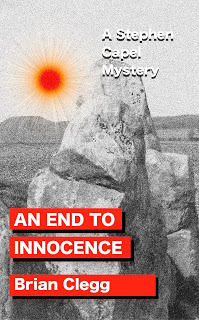 The latest self-pubbed Capel
The latest self-pubbed Capelnovel, An End to Innocence I've been a professional writer for over 20 years, but when I first started to get into writing, I wrote a number of novels which, despite getting positive feedback from publishers, never made it into print. For a long time they languished in the electronic equivalent of the back of a drawer, but the relative ease of modern self-publishing made me wonder if it was worth digging them out - and it has been a really positive experience.
I've now published five of my Stephen Capel detective novels - three written way back when and just updated to introduce trendy aspects such as mobile phones, plus two written over the last couple of years. I used Amazon's Createspace platform, and though it appears somewhat overwhelming to start with, if you take it steadily it is surprisingly painless.
For the interior of the book, I've used the Createspace formatted Word template on offer to download, which provides a very professional looking layout. The default page size is 6x9, but that's rather large for a typical mass market paperback, so I opted instead for 5x8. One early lesson from getting a printed proof is to go for cream paper rather than white, which yells 'self published' at the reader.
Similarly, for the cover I made use of a template - the PDF version - which I read into my graphics editor and used as a backdrop layer to set up the cover. It is possible to use a built-in cover designer on Createspace, but assembling your own allows for a lot more flexibility.
Once you've got the basics in, it's really important to print off a proof copy, both to make sure the layout works well and so someone else can proofread it - one thing the professional publishing process has hammered into me is that it's very difficult to spot all the mistakes in your own writing, and a proofreader makes all the difference.
Then it's just a matter of a final on-screen check and pressing the button to get publication in motion. (There's a bit more fiddling around over pricing and distribution, but it's straightforward.) You can have a finished copy of your book dropping through the letterbox within a few days. And your book can get to your readers even faster as a few more clicks sends it through to KDP - the Kindle development platform, providing a professional ebook finish, again via Amazon. One useful tip here picked up from the pros, is it's a good idea to do a slight variant on your book interior for the Kindle version, moving the copyright page to the back of the book.
Then all you have to do is make the world aware of your book - the hardest part, I suspect. I've had very positive feedback from readers who aren't friends and relations - but it is difficult to become visible in this kind of market. Even if the books don't become bestsellers, though, it's great that there's a chance for people to see them rather than leave them at the bottom of that fusty virtual drawer.
If you're interested, you can see all my fiction offerings here, mostly at the bargain prices of £6.99 for a paperback and £1.99 for a Kindle copy.
Published on August 11, 2017 01:56
August 4, 2017
Review - Wolfbane ****
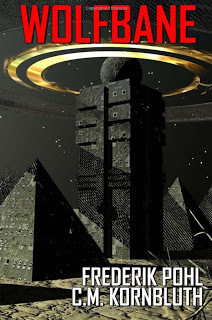 Every now and then I like to re-read an SF classic, and there are rarely safer hands to be in than those of Pohl and Kornbluth. I was surprised as I got into it that I couldn't remember a thing about this book - I suspect it's because despite featuring a number of 'adventure' scenes, it is so cerebral. And that is a limitation - but its one that reflects a daring and impressive piece of writing.
Every now and then I like to re-read an SF classic, and there are rarely safer hands to be in than those of Pohl and Kornbluth. I was surprised as I got into it that I couldn't remember a thing about this book - I suspect it's because despite featuring a number of 'adventure' scenes, it is so cerebral. And that is a limitation - but its one that reflects a daring and impressive piece of writing.Wolfbane starts with what seems to be a fairly straightforward 'rebel in a straight laced society of the future' storyline, with the 'What's in it for me?' main character Glenn Tropile getting in trouble in a society where everything is buttressed by ritual and formality - but that's just the beginning. We get an Earth that has been ripped away from the solar system, just about kept alive by the Moon, recreated as a sunlet every few years. And we have some of the most enigmatic and alien aliens I've come across, pyramids that rarely move and that harvest people to use as components in their technology.
There is drama here, when Tropile is threatened with death by having his spinal fluid drunk - and when the main characters are taken to the aliens' base and attempt to win back control of their world and lives - yet even that battle for survival has a strangely detached character, in part because, by now, some of those people have ceased to be truly human.
So don't pick this book up if you want a page turner or beautifully crafted characterisation, but as a science fiction novel of ideas, despite its inevitably dated feel - the original version dates back to 1959 - it is up there with the best. Writer and SF enthusiast Edmund Crispin comments on the back that it combines 'Pohl's sensibility and Kornbluth's ruthlessness' - I'd say that Kornbluth had the upper hand if that's the case, as this one of the purest and most ruthless pieces of science fiction writing I've ever encountered.
Wolfbane is available from amazon.co.uk and amazon.com
Published on August 04, 2017 06:12
Big Data? So what?
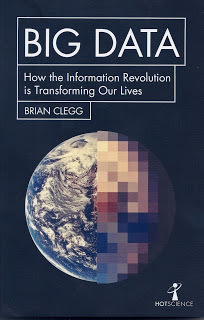 I'm delighted to say that my new book, Big Data is now available... but you may think 'So what?' data's not exactly new. What's the fuss all about? This extract from the introduction explains why:
I'm delighted to say that my new book, Big Data is now available... but you may think 'So what?' data's not exactly new. What's the fuss all about? This extract from the introduction explains why:It’s hard to avoid ‘big data’. The words are thrown at us in news reports and from documentaries all the time. But we’ve lived in an information age for decades. What has changed?
Big data has enabled Netflix, for instance, to take risks that conventional networks could never afford - and to target its marketing in a way that was never before possible. And big data is not just about business: among other things, it has the potential to transform policing by predicting likely crime locations; to animate a still photograph; to provide the first ever vehicle for genuine democracy; to predict the next New York Times bestseller; to give us an understanding of the fundamental structure of nature; and to revolutionise medicine.
Less attractively, it means that corporations and governments have the potential to know far more about you, whether to sell to you or to attempt to control you. Don’t doubt it – big data is here to stay, making it essential to understand both the benefits and the risks.
The power of big data derives from collecting vast quantities of information and analysing it in ways that humans could never achieve without computers in an attempt to perform the apparently impossible.
Data has been with us a long time. We are going to reach back 6,000 years to the beginnings of agricultural societies to see the concept of data being introduced. Over time, through accounting and the written word, data became the backbone of civilisation. We will see how data evolved in the seventeenth and eighteenth centuries to be a tool to attempt to open a window on the future. But the attempt was always restricted by the narrow scope of the data available and by the limitations of our ability to analyse it.
Now, for the first time, big data is opening up a new world. Sometimes it’s in a flashy way with computers like Amazon’s Echo in the home that we interact with using only speech. Sometimes it’s under the surface, as happened with supermarket loyalty cards. What’s clear is that the applications of big data are multiplying rapidly and possess huge potential to impact us for better or worse.
Big Data is available from amazon.co.uk and amazon.com
Published on August 04, 2017 01:37
August 3, 2017
'Two cultures' is live and well on Pointless
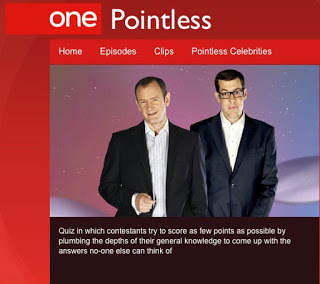 To get into this topic I have to admit to a guilty pleasure - when I want to have a totally undemanding half hour in front of the TV to unwind, I rather enjoy the quiz show,
Pointless
. But the last episode I watched made me think that C. P. Snow's 'Two cultures' is alive and well on the BBC.
To get into this topic I have to admit to a guilty pleasure - when I want to have a totally undemanding half hour in front of the TV to unwind, I rather enjoy the quiz show,
Pointless
. But the last episode I watched made me think that C. P. Snow's 'Two cultures' is alive and well on the BBC.In 1959, Snow explored the painful divide between the science and the arts - and the imbalance in that divide culturally. He pointed out that while we expect scientists to appreciate the arts - and the vast majority do - those from the 'arts' side of the divide (which includes most broadcasters and journalists) considered it almost a badge of honour that they knew nothing about the sciences.
In many ways (and, dare I say it, in part due to good popular science books and broadcasting) that divide is weaker than it once was - but Pointless presenter Alexander Armstrong (a man with an English degree) demonstrated painfully that there is still a strong support for this sad divide.
A contestant was pointing out that she wouldn't do very well in a chemistry round, because she had attended an art school since the age of four. My personal reaction was horror. What a limited education. Who can say whether a four-year-old will be more interested in the arts or the sciences? When I speak to at junior schools, the children are universally excited by science. Poor, deprived person, I thought. (And I would say the same of someone who knew nothing about the arts because she attended a 'science school' from age four.) But Armstrong was effusive at significant length about how wonderful this was. With his two cultures blinkers on, Armstrong saw this as a school that provided the important stuff and omitted the irrelevant.
We've heard a lot lately about lack of gender equality in the BBC - perhaps it's time we had a bit less arts/sciences inequality too.
Published on August 03, 2017 02:19
July 29, 2017
Review - Resorting to Murder ***
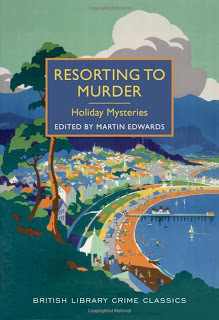 Not surprisingly bought as a holiday read, Resorting to Murder was pleasant enough to pass the time, but didn't really hit the spot. Part of the problem is that by comparison with the opening Sherlock Holmes story (The Adventure of the Devil's Foot: itself not one of Conan Doyle's best as a mystery, though decidedly an atmospheric piece of writing), it becomes obvious that a lot of the classic crime writers featured here weren't very good at crafting an entertaining story.
Not surprisingly bought as a holiday read, Resorting to Murder was pleasant enough to pass the time, but didn't really hit the spot. Part of the problem is that by comparison with the opening Sherlock Holmes story (The Adventure of the Devil's Foot: itself not one of Conan Doyle's best as a mystery, though decidedly an atmospheric piece of writing), it becomes obvious that a lot of the classic crime writers featured here weren't very good at crafting an entertaining story.It was fun to discover the holiday locations, many of them in the UK or France, and some of the stories worked well, but too many seemed to lack either literary or mystery value. In a couple of cases, the storyline really didn't hold together - it was difficult to make any great sense of what had happened - or the whole thing was a little too far-fetched (as in the otherwise quite entertaining mystery of the mother who disappears from a French hotel, along with the room she had been staying in).
If, like me, you are very fond of period British murder mysteries, you will probably still enjoy this collection. But otherwise I'd give it a miss.
Resorting to Murder is available from amazon.co.uk and amazon.com
Published on July 29, 2017 06:04
Review - The Bible for Grownups ****
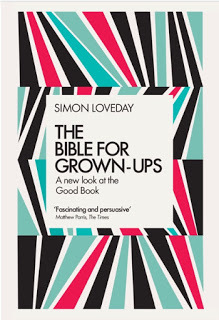 If your immediate thought on seeing a book about the Bible is 'I'm not religious, so it's not for me,' don't worry - it still could be. Without doubt, the Bible has had a huge impact on the world - and, Simon Loveday reminds us - in some forms, notably the Authorised Version (King James Bible), it is also an impressive piece of literature and a big part of our cultural heritage.
If your immediate thought on seeing a book about the Bible is 'I'm not religious, so it's not for me,' don't worry - it still could be. Without doubt, the Bible has had a huge impact on the world - and, Simon Loveday reminds us - in some forms, notably the Authorised Version (King James Bible), it is also an impressive piece of literature and a big part of our cultural heritage.What Loveday sets out to do is to see how the Bible was put together, telling us why it is in the form it is and helping us understand the combination of different types of literature that don't really correspond to modern day forms - and he does this very well. This book is to biblical scholarship what popular science is to science. Loveday is not trying to come up with a new and different analysis of the Bible, but rather to help the vast majority of us (both Christians and non-Christians) who really don't understand its geo-political context, what is historical and what is more mythical in nature, and how the whole thing was assembled.
I found the book fascinating, whether we're getting a feel for the timescales of writing the different parts of the Old Testament, or the reasons for the very different approaches taken by the writers of the New Testament. Again, while it's nothing new, Loveday makes it clear that writers at the time the various parts of the Bible were composed were not in the business of writing about facts but about what they saw as truths. This meant they would be far freer and looser with 'history' than we would now, because it was the message that was important, not the factual accuracy. (This should both placate those who dismiss the whole thing because of its inconsistencies, of which there are many, and should totally dismiss the idea of the Bible being literally the word of God - though adherents of either camp aren't great on listening to reason.)
Perhaps the most dramatic message that comes through is that because different parts were written by different authors with widely varying agendas, it's impossible to use the Bible alone as a guide to living your life - because it will encourage you to many totally contradictory actions. It can only be used in this way subject to interpretation and mentally editing out the bits you don't like - something anyone who claims to base their way of life on the Bible without any interpretation needs to consider.
I would have given the book five stars, but after two cracking sections (one on each Testament), the final section of the book, which tries to pull everything together and to give an appreciation of the Bible as literature is relatively weak, so we don't get the best of conclusions - but The Bible for Grownups is well worth reading for those first two sections (which account for 197 of the 260 main text pages). If you are a believer, this book will help you understand the basis of your faith better - if you aren't, it will provide a better understanding of the nature of this remarkable collection of writings.
The Bible for Grownups is available from amazon.co.uk and amazon.com
Published on July 29, 2017 05:37
July 19, 2017
No surprises on virtual reality
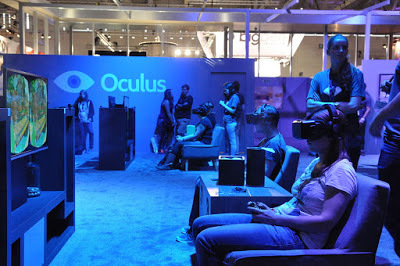 Because it works here doesn't mean it will work in your lounge
Because it works here doesn't mean it will work in your lounge(Image from Wikipedia )I read recently that Facebook is slashing the price of its Oculus Rift virtual reality (VR) goggles, suggesting that they simply aren't selling as expected. But, to be honest, this comes as no surprise at all. I would suggest that VR suffers from exactly the same problems as 3D TV did (remember that?). There are some inconveniences we are prepared to suffer relatively briefly for the novelty experience. Think 3D glasses in the cinema or a VR experience at a games show. But for our everyday viewing or game playing, we don't want to be encumbered by attaching chunky hardware to our face.
I'm not saying that VR won't happen - it probably will. But I suspect it will only really become mainstream when it can either be done passively - using a large curved screen, for example - or if the headgear is so light and unobtrusive that we really don't care that it's there.
What amazes me here is the inadequacy of those who have the job of guessing whether or not a technology will be popular. Admittedly, future gazing is no exact science. We will always get things wrong. As I've mentioned before, Alvin Toffler's book Future Shock was huge in the 70s, but wildly inaccurate with its tech predictions. And wonderful though the movie 2001, A Space Odyssey is, its technology predictions are a lesson in how to get it wrong.
I'm not claiming any great ability as a futurologist. But sometimes it's easy to see that there are some experiences that don't translate well from a special location or event into everyday in the home. And VR as it currently stands is one of them.
Published on July 19, 2017 06:26
July 14, 2017
Is the endowment effect really irrational?
 What's it worth?There's nothing a psychologist likes better than to wind up an economist, and in the 70s psychology succeeded big time with the endowment effect. Economics expects us to give an object a value, and that value should determine how we would price it to buy it or sell it. But experiments have shown that we value something we own a lot more than the same object if we don't own it.
What's it worth?There's nothing a psychologist likes better than to wind up an economist, and in the 70s psychology succeeded big time with the endowment effect. Economics expects us to give an object a value, and that value should determine how we would price it to buy it or sell it. But experiments have shown that we value something we own a lot more than the same object if we don't own it.Economists, and us sciencey types who want people to be more rational, tend to highlight the endowment effect as one of the 'errors' people suffer from in making rational decisions. But I'd suggest, as is often the case in science, it's more complicated than that.
Here are two suggestions as to why the endowment effect can be just as rational as an other approach. I'm going to take a variant of the original experimental demonstration of the endowment effect to show this. In our experiment, some participants are given a mug, then later asked how much they'd accept to sell it back. Others are asked what they would pay to buy the same mug. Those who have been given the mug tend to value it around twice as highly as those who are asked to buy it. But is that really as irrational as some seem to think?
Firstly there's incomplete knowledge. Traditional economics assumes that we have complete knowledge to be able to make a rational decision. But the real world isn't like that. If I've got the mug, I have more knowledge than if I don't. I know, for instance, that it's a solid product that exists and that the other person can't cheat me in the sale. But in the other scenario, I could get ripped off in all sorts of dodgy trader fashions. It's reasonable to value a product you have more information on higher than one you know less about.
That's a well-known challenge to considering the endowment effect an error. But I think there's another one that is less frequently mentioned. Like many people, I've got plenty of mugs. I'll take one if you give it to me, but I'm not going to buy one, even for a small amount. I don't need any more mugs. So my 'what will you buy it for' value is very low. But if I have a mug and you say you'll pay me money for it, I obviously want to maximise my return. I'm not going to say 'It has no value to me, so you can have it for free.' I'll ask what I think I can get away with, based on the typical price of mugs in shops - inevitably a much higher value than my own.
So, next time you see one of those lists of ways humans don't act rationally and it includes the endowment effect, bear in mind that people aren't as simple as this kind of analysis suggests.
Published on July 14, 2017 00:51
July 13, 2017
Shall I compare thee to a summer's day - the problem with comparison reviews
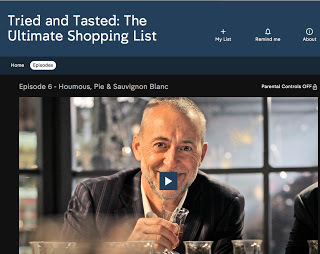 I'm a sucker for consumer programmes, especially those that give us an expert opinion on everyday products, such as Channel 4's
Tried and Tasted
. It's cheap and cheerful stuff - but there's something highly entertaining about a panel including Michel Roux Jr and Jay Rayner blind tasting meat pies and ice cream (not simultaneously). However, this show presents us with an extreme example of the problem facing most comparative reviews - how do you choose the products to be in your sample?
I'm a sucker for consumer programmes, especially those that give us an expert opinion on everyday products, such as Channel 4's
Tried and Tasted
. It's cheap and cheerful stuff - but there's something highly entertaining about a panel including Michel Roux Jr and Jay Rayner blind tasting meat pies and ice cream (not simultaneously). However, this show presents us with an extreme example of the problem facing most comparative reviews - how do you choose the products to be in your sample?Don't get me wrong, I'm not knocking the journalists who suffer their way through a comparative test. I once tested getting on for 70 laptops (over a year, not all at once) for a magazine, and it's an arduous job. But the fact remains that unless you try absolutely everything you can get your hands on, as I did with those laptops, there is a hidden selection process going on, which can strongly skew the results.
To take a recent example, I saw in a newspaper a comparison of supermarket croissants. Winner was the expensive Waitrose 1 Normandy butter croissants, while, for example, Asda's version which were long life and individually wrapped (and, frankly, not very nice) received a good dressing down as not coming close to anything that could really be said to resemble a croissant. But the thing is, both Asda and Waitrose sell more than one type of croissant. Asda also has a Normandy butter croissant in its 'Extra Special' range which is pretty much the real thing - certainly far better than its long life, straight and squidgy version. So how do they decide which croissants we see and which we don't?
This pre-selection is taken to the extreme on Tried and Tasted, where only four products are compared. I can see that a small sample is necessary for TV, and they try to mix it up by having, say, two supermarket products, one branded and one artisan - but it's still a very restricted set. So while we can enjoy the fact that M and S makes the best steak and ale pie from the four selected, or that Asda and Tesco's hummus offerings were rated far better than the much more expensive branded and artisan versions, it would be easy enough to produce a totally different ranking using the same divisions of supermarket/branded/artisan but with different choices.
The most important thing - which should, surely be obvious - is to compare like with like. If you're going to look at premium croissants, only look at premium croissants. No one would seriously consider a comparative car review putting a Vauxhall Corsa, and Aston Martin DB10 and a stretched limo against each other. Unless you divide your products into sensible categories, you will always have the danger of a very mixed and misleading comparison.
Published on July 13, 2017 03:50



